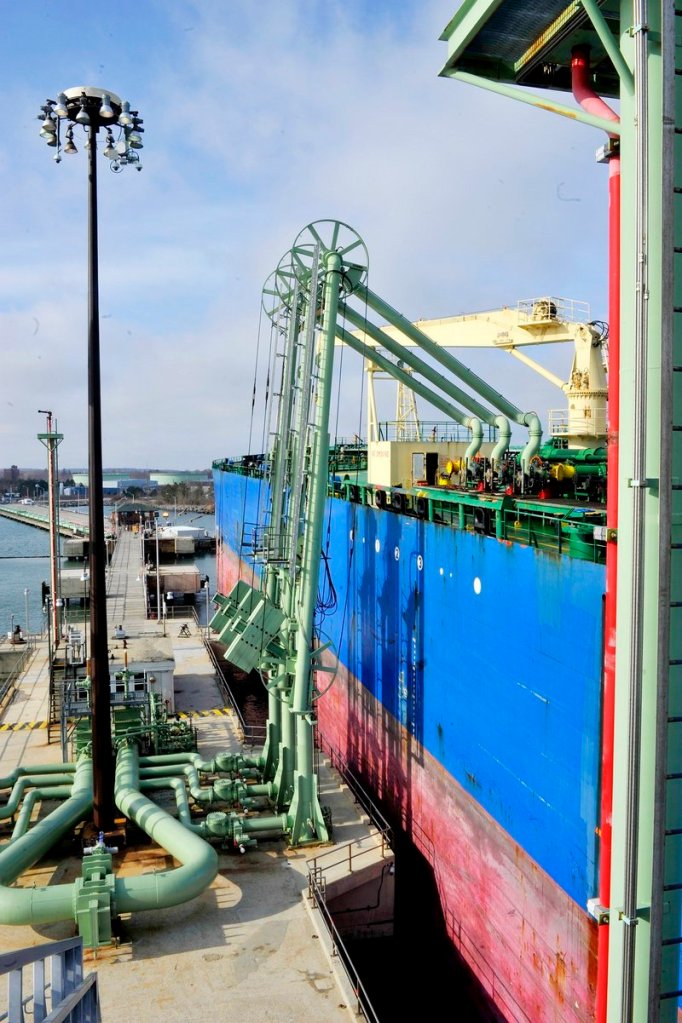The debate over whether so-called Canadian tar sands oil will ever flow through South Portland has just gotten stickier.
Anti-tar sands activists and residents say a proposed city ordinance is a narrowly tailored law designed to squelch the possibility of Portland Pipe Line Corp. ever using its 236-mile underground pipeline to bring the crude oil from Canada to Portland Harbor.
But some powerful opponents emerged this week to say the proposal would affect oil terminals and businesses that have nothing to do with the tar sands conflict.
With voters expected to decide in November, the campaign has already developed signs of a complex legal dispute with nuanced interpretations of zoning law and court precedent.
And it’s clear now that tar sands opponents have a powerful foe.
South Portland’s six large oil terminals generate about $1.6 million in annual tax revenue for the city and represent about 2.7 percent of the city’s tax base.
The standoff in South Portland could play a key role in an international struggle over Canada’s ability to export the crude oil that is abundant in the tar sands of Alberta.
The Portland Pipe Line is seen as one of the possible ways for Canada to export the oil, although the company that owns it has not made a proposal to do so.
Opponents say tar sands crude is an especially risky oil because it is sticky and corrosive and that its export into the global market will accelerate climate change.
Petroleum industry representatives deny that the oil poses any greater risk of leaking or spilling than the crude oil that already flows through the Portland Pipe Line from South Portland to Montreal. The pipeline’s operators also point to a strong safety record in South Portland and all along the pipeline.
Tar sands opponents in Maine, including many who held a rally Thursday night in Portland, see the proposed South Portland ordinance as a potentially decisive effort. The stakes also appear to be high for the pipeline and the city’s large oil industry.
At a South Portland Planning Board meeting Tuesday, advocates and opponents of the pre-emptive ban fundamentally disagreed about the meaning of the measure’s language and how those words may be brought to bear on existing businesses that have little or nothing to do with tar sands oil or the pipeline.
The Concerned Citizens of South Portland, which wrote and proposed the measure, say that existing businesses that pump, store and handle petroleum and petroleum-related products will be allowed to continue to operate as they have been. They would only be prohibited from expanding in any way that would allow them to accept tar sands shipments.
“Anyone familiar with the zoning process would expect (city) staff to step forward and explain to the board that all existing uses can continue,” said Natalie West, an attorney for the group who helped author the proposed law. “Changes in zoning laws do not ‘shut down’ existing uses.”
Opponents of the proposal say the law’s language is overly broad, stands at cross-purposes with existing long-term land-use plans, and would hamstring a variety of unrelated businesses from updating equipment and expanding their operations along sections of the waterfront, eventually hampering their ability to stay afloat.
“What are these people trying to do?” said Jamie Py, president of the Maine Energy Marketers Association, an industry trade group that has created a ballot initiative committee to oppose the measure. “They don’t want to bring in Canadian oil sands, so their purpose then becomes, ‘let’s not allow anybody to do anything new on the waterfront.’“
In Py’s interpretation, the ordinance would bar a petroleum-handling company from even fixing broken equipment or installing new technology that would carry out an existing and permitted use, such as off-loading crude oil.
As written, the technical and complex measure would implement several key changes to current zoning law.
For example, petroleum storage tank farms and accessory facilities in the shipyard district would be allowed for the “unloading of petroleum products from ships docking in South Portland” only. It would ban expansion of existing tank farms and accessory facilites and construction of new facilities on existing piers in the shipyard district, among other changes.
The two sides also disagree sharply on whether the proposal is consistent with the city’s comprehensive plan, a key issue before the city Planning Board.
The Planning Board has been tasked by the City Council with determining whether the proposed ordinance complies with the vision for each affected area. The board is not expected to vote on a recommendation until its next meeting Aug. 13.
The council also will hold a public hearing on the proposal before likely placing it on the ballot in November.
Soon, the conversation surrounding the proposed ordinance will become a lot more public, and will see more direct outreach to voters by oil companies and their supporters.
The committee established by Py’s trade group will allow petroleum-related companies to raise and spend money for a campaign to defeat the ballot question.
And petroleum is a big industry in South Portland.
The city’s six large terminals bring in oil products and then distribute heating oil and gasoline throughout New England. They handle more than 100 million barrels of oil a year and made Portland Harbor the second largest oil port on the East Coast in 2012, according to state data.
Portland Pipe Line Corp. was the city’s sixth largest taxpayer in 2012. It is valued at $45 million and paid about $750,000 in taxes, according to City Assessor Elizabeth Sawyer.
Five other petroleum terminal operators represented about $40 million in property value. Those terminals, along with two related tank facilities, generated roughly $840,000 in taxes in 2012.
A spokesman for the energy marketer’s association declined this week to describe the group’s campaign plans, but said the group will stand with the people and small businesses that rely on the working waterfront.
Matt Byrne can be reached at 791-6303 or at:
mbyrne@pressherald.com
Send questions/comments to the editors.





